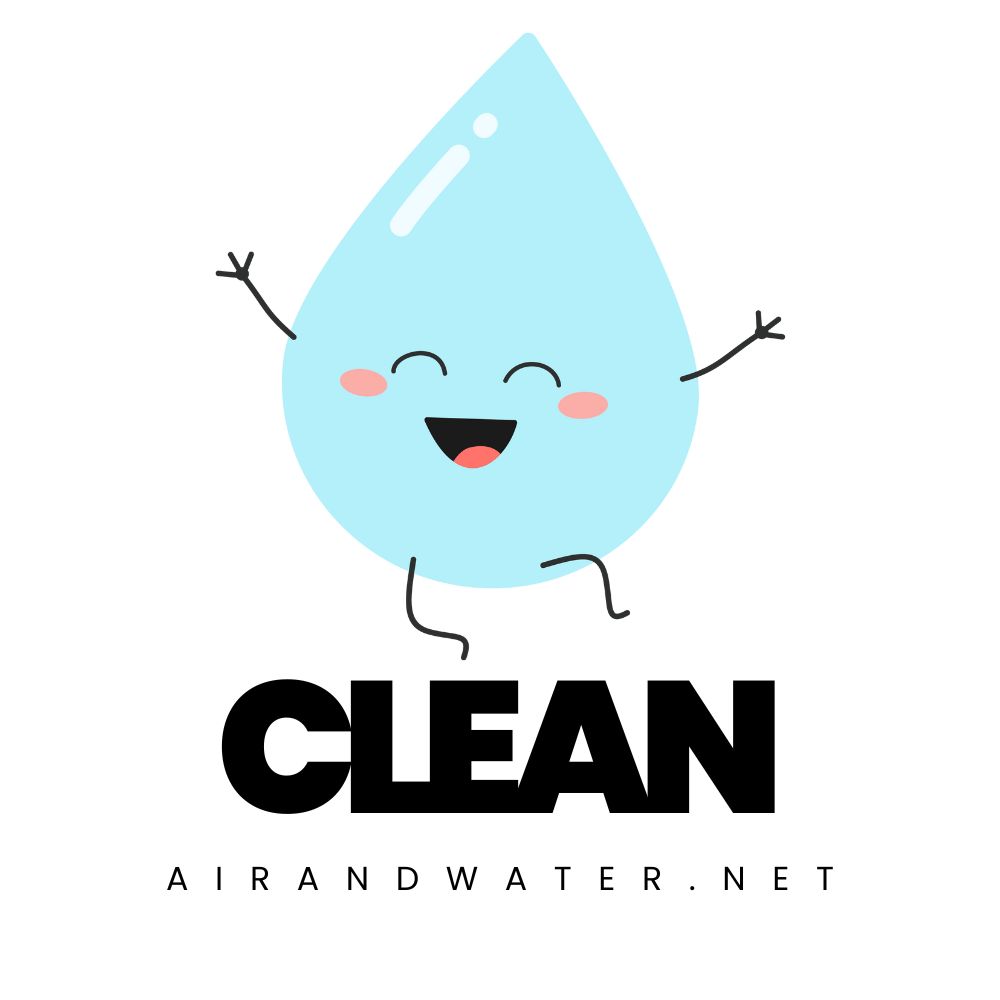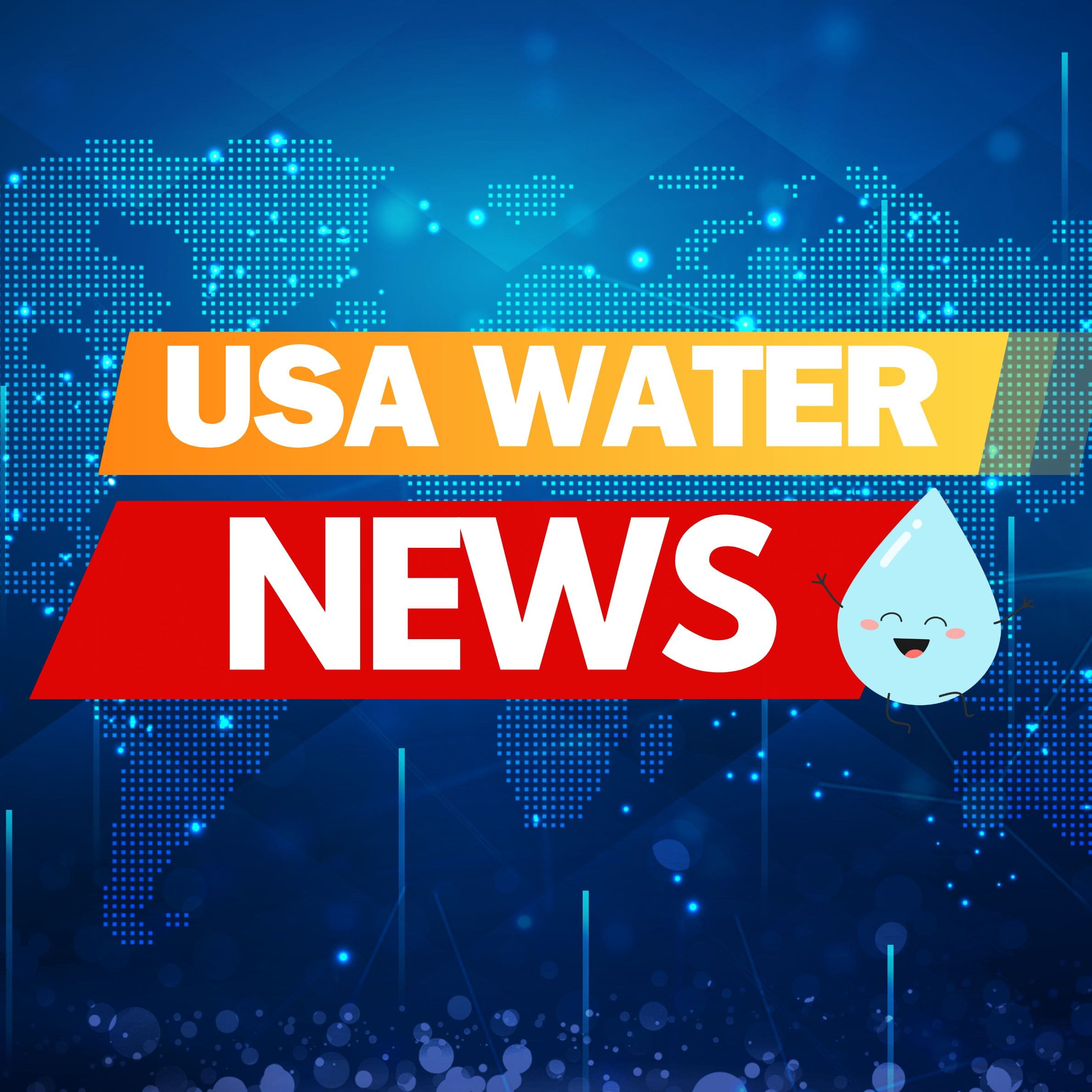Fresno Water Quality at a Glance
serious concerns
Is Fresno Water Safe to Drink?
Yes, With Significant Caution – Fresno water generally meets federal standards, but the city faces severe PFAS contamination with some of the highest levels in the U.S., affecting over 547,000 residents. Additional concerns include dangerous levels of chromium-6, industrial solvents, and elevated disinfection byproducts. Agricultural pesticides and naturally occurring uranium further complicate the water quality picture in this Central Valley agricultural hub.
⚠️ Key Concerns for Fresno Residents
- PFAS “Forever Chemicals”: PFOS levels at 30 ppt (7.5x above EPA safe limit); PFOA at 16 ppt (4x above safe limit); among highest in U.S.
- Chromium-6 Cancer Risk: 448 sources in Fresno County with chromium-6 levels 1-5 μg/L; some areas exceed 10 μg/L safe limit
- Industrial Solvents: TCE, PCE, and other carcinogenic chemicals detected from agricultural and industrial activities
- Disinfection Byproducts: Elevated trihalomethanes and haloacetic acids from chlorination processes increasing cancer and reproductive risks
Read the full report below for detailed analysis, city-specific data, and actionable recommendations for Fresno residents.
Fresno – California – Water Quality Report 2025: PFAS Testing, Infrastructure Concerns & Safety across your city
Fresno’s Department of Public Utilities (DPU) Water Division serves over 540,000 residents, making it one of the largest exclusively groundwater-dependent systems in the United States. The utility manages approximately 1,800 miles of water mains, 260 groundwater wells, and delivers an average of 125 million gallons daily to this growing Central Valley community.
Unlike most major California cities, Fresno relies almost entirely on groundwater pumped from the Kings Subbasin of the San Joaquin Valley Groundwater Basin for its municipal water supply. This unprecedented dependence on groundwater presents unique challenges as the region faces long-term aquifer depletion and emerging contamination concerns including PFAS “forever chemicals” and industrial solvents. Despite receiving only 11 inches of average annual rainfall, Fresno has implemented innovative water management strategies including groundwater recharge facilities, water conservation programs, and a recent transition to partial surface water treatment. The city’s “Recharge Fresno” program represents a $600 million investment to diversify water sources, improve infrastructure, and ensure sustainable water supplies for this agricultural hub in California’s drought-prone Central Valley.
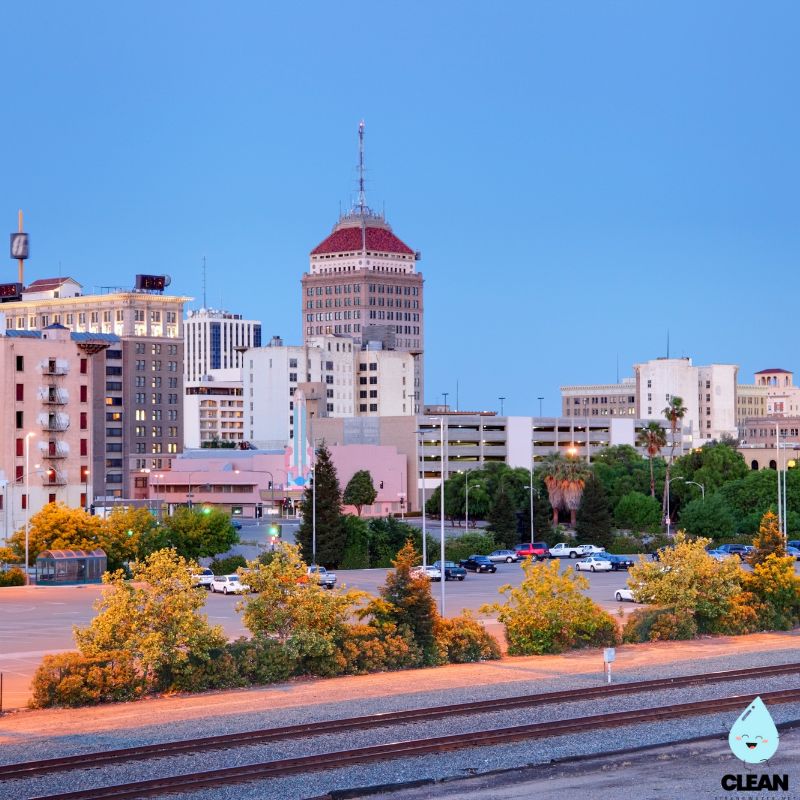
Fresno Water Quality: Current Status (2024-2025)
Latest Testing Results
- PFAS Contamination: Recent testing (February 2024) revealed alarming PFAS levels with PFOS at 30 parts per trillion (ppt) and PFOA at 16 ppt, both exceeding EPA’s new 4 ppt safety limits effective April 2024.
- Lead Levels: The most recent testing period (January-December 2023) showed 90th percentile lead levels of 2.5 parts per billion (ppb), well below the EPA action level of 15 ppb, reflecting Fresno’s newer infrastructure and effective treatment protocols.
- Testing Scope: Fresno conducts over 50,000 water quality tests annually, monitoring for more than 100 regulated contaminants and additional unregulated substances through its comprehensive sampling program.
- Compliance Status: While Fresno’s water meets most federal and state drinking water standards, the city faces significant challenges with PFAS contamination, chromium-6 levels, and industrial solvent detections that exceed health guidelines.
Groundwater Supply
- San Joaquin Valley Aquifer: Primary source (approximately 80% of supply) with water drawn from 260 active wells across the city, providing naturally filtered water with variable quality depending on location and depth.
- Surface Water Treatment: The newer Northeast Surface Water Treatment Facility now provides approximately 20% of Fresno’s water supply, treating water from the Kings River and Millerton Lake to reduce groundwater dependence.
- Aquifer Protection: Comprehensive groundwater management strategy including artificial recharge basins, injection wells, and participation in the North Kings Groundwater Sustainability Agency to address contamination and depletion concerns.
Treatment Excellence
- Groundwater Treatment: Selective wellhead treatment including granular activated carbon filtration and ion exchange systems at wells with identified contaminants of concern, particularly for TCP and industrial solvents.
- Surface Water Treatment: State-of-the-art T.L. Swiridoff Northeast Surface Water Treatment Facility utilizing membrane filtration, ultraviolet disinfection, and advanced oxidation processes to provide cleaner water alternatives.
- Disinfection: Chlorination of groundwater at wellheads and advanced disinfection at the surface water treatment plant, with continuous monitoring to maintain effective pathogen control while managing disinfection byproduct formation.
Infrastructure Transformation
- Recharge Fresno Program: $600 million investment in water infrastructure including surface water treatment, transmission pipelines, and groundwater recharge facilities to address both supply and quality challenges.
- Southeast Surface Water Treatment Plant: New facility under construction to further reduce groundwater dependence and improve water quality in southern Fresno neighborhoods, particularly addressing areas with higher contaminant levels.
- Advanced Metering Infrastructure: Citywide installation of smart meters with leak detection capabilities and real-time consumption monitoring to improve conservation and system management during ongoing drought conditions.
Drought Resilience Planning
Fresno has developed a forward-looking water sustainability strategy addressing the unique challenges of California’s drought cycles, groundwater depletion, and emerging contaminant concerns. The city’s “Water Resource Management Plan” and “Drought Contingency Plan” include measures to increase groundwater recharge through purpose-built basins that capture stormwater and flood releases from local rivers. Fresno’s “Big Dry Creek Groundwater Recharge Project” and “Leaky Acres Recharge Facility” collectively can return billions of gallons of water to the aquifer annually while helping dilute contamination. The city has implemented one of California’s most aggressive water conservation programs, reducing per capita water use by over 30% since 2000 through progressive water rates, landscape conversion programs, and efficiency requirements. Fresno’s water planning specifically addresses SGMA (Sustainable Groundwater Management Act) compliance and PFAS remediation strategies, with infrastructure designed to achieve groundwater sustainability by 2040 while maintaining reliable service during extended drought periods that are becoming increasingly common in California’s Central Valley.
Recommendations for Fresno Residents
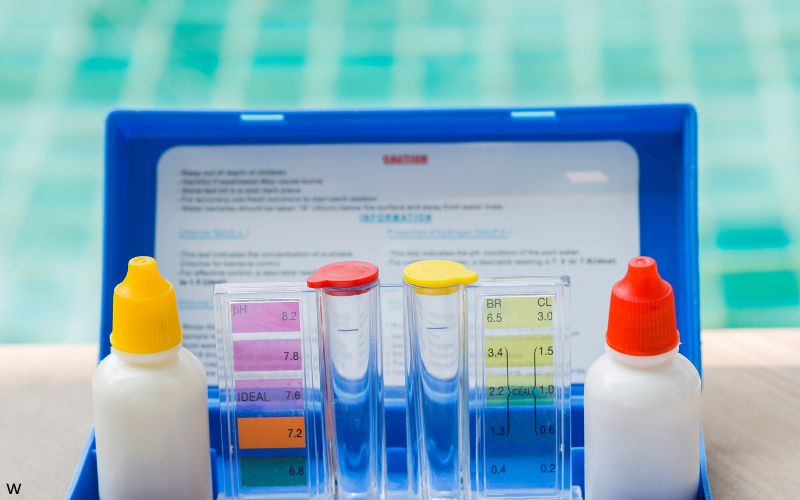
Request Water Testing
Fresno residents can request free water quality testing by calling (559) 621-5300. This service is particularly recommended for households in areas with known PFAS, chromium-6, TCP, or nitrate concerns, especially those with older plumbing systems installed before 1986.
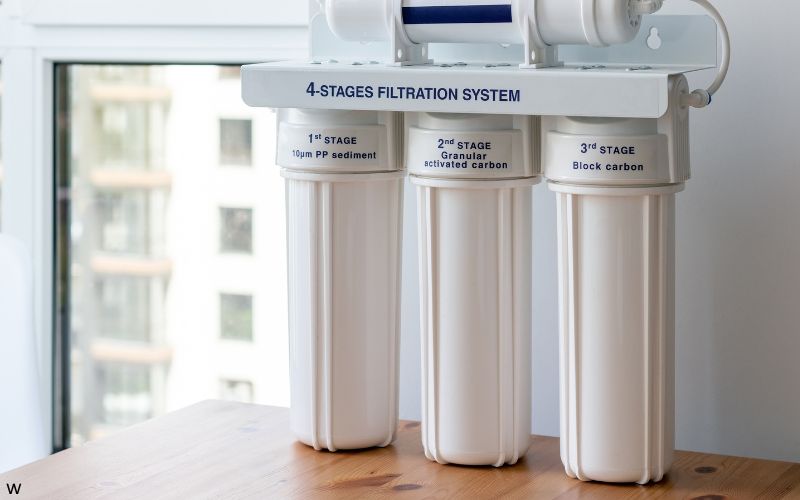
Consider Advanced Filtration
Given Fresno’s PFAS contamination and chromium-6 concerns, residents should strongly consider NSF-certified reverse osmosis systems or activated carbon filters specifically rated for PFAS removal. For areas with elevated nitrate levels, reverse osmosis systems certified under NSF/ANSI Standard 58 are recommended.
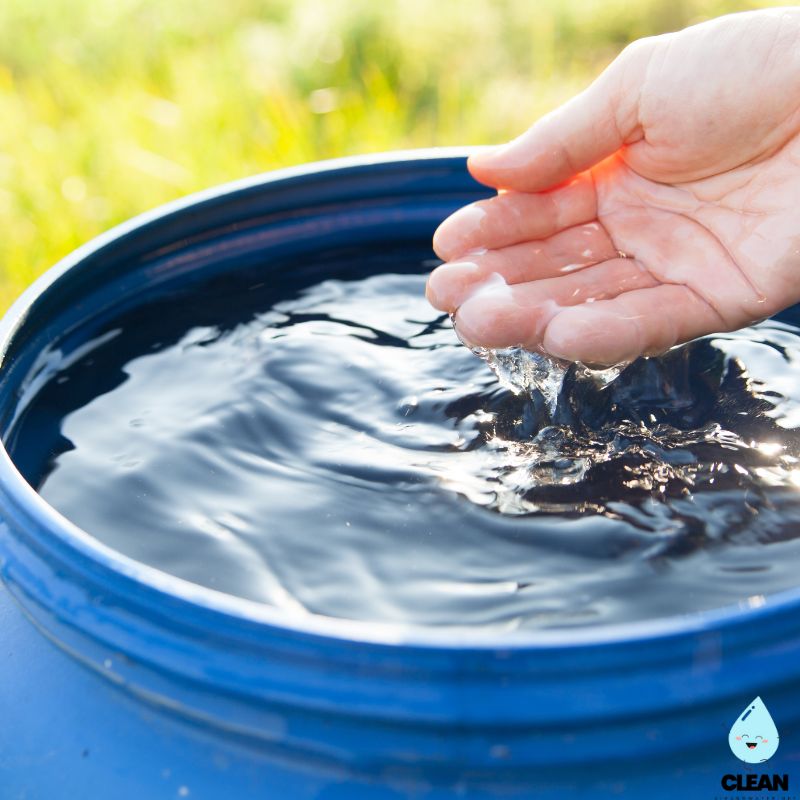
Implement Water Conservation
Take advantage of Fresno’s water conservation programs, including rebates up to $1,000 for water-efficient landscaping and up to $100 for high-efficiency toilets and smart controllers. Visit www.fresno.gov/waterconservation for program details.

Follow Watering Schedule
Adhere to Fresno’s outdoor watering schedule based on your address. Year-round water regulations limit watering to specific days and prohibit water waste. Download the Fresno H2O app for reminders and to report water waste.
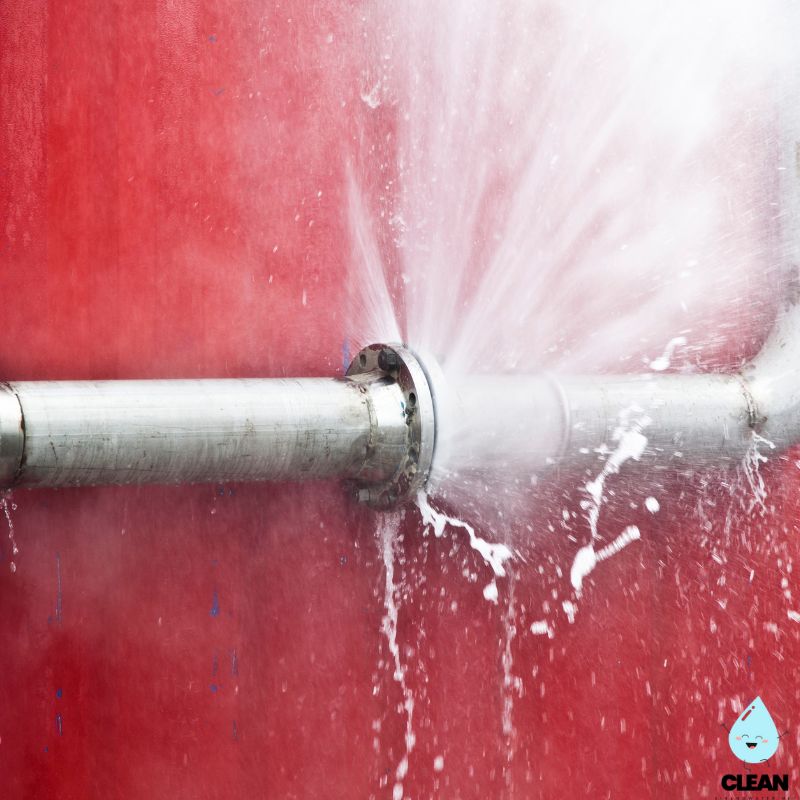
Report Water Issues
Report water main breaks, water quality concerns, or pressure problems immediately through the FresGO app or by calling (559) 621-CITY. Early reporting helps DPU respond quickly and prevent potential contamination.
Quality News About Your Water
Get the comprehensive water quality news coverage you need with our dedicated US Water News Service. From coast to coast, we deliver in-depth reporting and expert analysis on PFAS contamination, EPA regulatory changes, infrastructure developments, and emerging water safety issues affecting communities nationwide. While mainstream media only covers the biggest stories, we provide the detailed, ongoing coverage that helps you understand the full scope of America’s water challenges. Whether you’re a concerned citizen, water professional, or community leader, our daily updates and analytical insights keep you informed about the issues that matter most to public health and environmental safety.
Frequently Asked Questions
Is Fresno’s tap water safe to drink?
Fresno’s tap water generally meets federal and state quality standards for regulated contaminants, but faces significant concerns with emerging contaminants. Recent testing revealed PFAS levels exceeding EPA’s new safety limits, with PFOS at 30 ppt and PFOA at 16 ppt (both above the 4 ppt safe limit established in April 2024).
The city also has documented issues with chromium-6, industrial solvents including TCE and PCE, and elevated disinfection byproducts. While the water undergoes treatment and testing, residents in affected areas should consider additional filtration, particularly reverse osmosis systems certified for PFAS removal.
Some residents may notice that Fresno water is relatively “hard” due to naturally occurring minerals in the groundwater. While this affects taste and can cause scaling on fixtures, it poses no health risk. However, given the documented contamination concerns, residents should request free water testing services from the City of Fresno to understand their specific exposure risks.
What are PFAS and how is Fresno addressing them?
PFAS (Per- and Polyfluoroalkyl Substances) are “forever chemicals” that don’t break down naturally and accumulate in the human body. Fresno has some of the highest documented PFAS levels in the United States, with recent testing showing PFOS at 30 ppt and PFOA at 16 ppt – both significantly exceeding EPA’s 4 ppt safety limits.
• Health risks: PFAS exposure is linked to cancer, liver damage, immune system suppression, and reproductive harm
• Treatment challenges: PFAS are extremely difficult to remove, requiring specialized filtration like granular activated carbon or reverse osmosis
• City response: Fresno is investigating treatment options and working with regulatory agencies, but no comprehensive PFAS removal system is currently in place
• Legal action: The city may pursue litigation against PFAS manufacturers for contamination costs
Given the severity of PFAS contamination, residents should strongly consider point-of-use filtration systems specifically certified for PFAS removal until citywide treatment is implemented.
How is Fresno addressing groundwater sustainability?
Fresno is implementing a comprehensive approach to groundwater sustainability in compliance with California’s Sustainable Groundwater Management Act (SGMA) while addressing quality concerns:
• Surface Water Integration: The Northeast Surface Water Treatment Facility and planned Southeast Surface Water Treatment Plant reduce groundwater pumping by utilizing Kings River and Millerton Lake water rights
• Recharge Infrastructure: Operation of over 20 groundwater recharge basins capturing stormwater and flood releases, with capacity to recharge billions of gallons annually while helping dilute contamination
• Recycled Water Program: Development of non-potable water distribution for landscape irrigation and industrial uses
• Conservation Programs: Tiered water rates, rebates for efficient fixtures, and drought-resistant landscaping incentives
• Regional Collaboration: Active participation in the North Kings Groundwater Sustainability Agency to coordinate aquifer management and contamination response
These efforts help stabilize declining groundwater levels while providing cleaner surface water alternatives to contaminated groundwater sources, working toward sustainability and improved quality by 2040.
Why does water quality vary in different parts of Fresno?
Water quality varies significantly across Fresno neighborhoods due to several factors:
• Geographic distribution of contaminants: PFAS, chromium-6, and agricultural chemicals are not uniformly distributed in the aquifer, with some wells showing much higher contamination levels
• Well depth and construction: Different wells draw from various depths and aquifer zones with distinct contamination patterns from historical agricultural and industrial activities
• Infrastructure age: Older neighborhoods may have aging pipes that can affect water quality at the tap
• Surface water integration: Northeast Fresno now receives cleaner treated surface water blended with groundwater, while other areas remain dependent on groundwater with variable contamination levels
• Targeted treatment systems: Some wells have specialized treatment for specific contaminants like TCP, while others may lack adequate treatment for emerging contaminants like PFAS
The city’s long-term plan includes expanding surface water treatment to additional areas, particularly in south Fresno where contamination concerns are more pronounced. The Southeast Surface Water Treatment Plant under construction will help address these disparities and provide cleaner water alternatives.
Contaminants of Concern

PFAS “Forever Chemicals”
Source: Industrial applications, firefighting foam, and consumer products containing non-stick and stain-resistant chemicals that have contaminated groundwater throughout the Central Valley
Health Effects: Linked to cancer (kidney, testicular), liver damage, immune system suppression, reproductive harm, and developmental effects; accumulate in human body over time
Current Status: PFOS detected at 30 ppt and PFOA at 16 ppt (February 2024), both exceeding EPA’s 4 ppt safety limits; affects over 547,000 residents with some of the highest levels documented in the U.S.

Chromium-6 (Hexavalent Chromium)
Source: Natural occurrence in Central Valley geology and industrial activities including metal plating, stainless steel production, and wood preservation; concentrated by drought conditions
Health Effects: Known carcinogen when inhaled; studies suggest increased cancer risk from ingestion; can cause liver and kidney damage with long-term exposure
Current Status: Fresno County has 448 water sources with chromium-6 levels between 1-5 μg/L; California’s drinking water limit is 10 ppb, but health advocates recommend much lower levels for safety
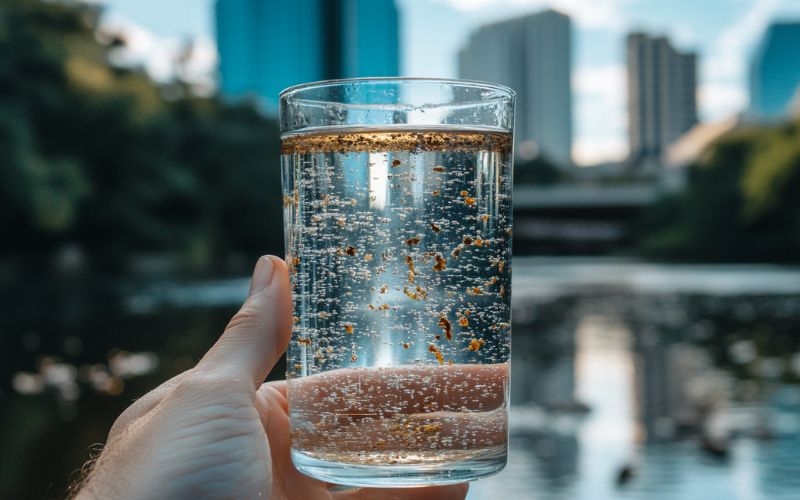
1,2,3-Trichloropropane (TCP)
Source: Agricultural soil fumigants used historically in the Central Valley, primarily from the 1950s through the 1980s, which has leached into groundwater
Health Effects: Classified as a likely human carcinogen based on laboratory studies; long-term exposure to elevated levels may increase cancer risk
Current Status: Detected in approximately 40% of Fresno’s wells, but treated with granular activated carbon where present; all distributed water meets California’s MCL of 5 parts per trillion

Industrial Solvents & Disinfection Byproducts
Source: TCE and PCE from industrial activities and dry cleaning; trihalomethanes and haloacetic acids form when chlorine reacts with organic matter during water treatment
Health Effects: Industrial solvents are potential carcinogens affecting liver and kidneys; disinfection byproducts increase cancer risk and may cause reproductive problems
Current Status: Various industrial solvents detected in Fresno water; elevated disinfection byproducts from chlorination processes; monitoring ongoing with treatment adjustments as needed
Please read – our information
The information presented on cleanairandwater.net is compiled from official water quality reports, trusted news sources, government websites, and public health resources. While we strive for accuracy and thoroughness in our presentations, we are not scientists, engineers, or qualified water quality professionals.
Our mission is to present water quality information in an accessible, real-world format that helps people understand what’s in their water and make informed decisions about their health and safety. We believe that complex environmental information should be available to everyone in a format that’s easy to understand.
We make every effort to ensure our content is current and accurate, but we cannot guarantee that all information is complete or error-free. This website should not replace official communications from your local water utility or health department. We always recommend consulting official sources for the most up-to-date information regarding your specific water system.
Clean Air and Water is not liable for any unintentional errors, omissions, or outdated information. The content on this site is provided for informational purposes only and should not be considered professional advice.
